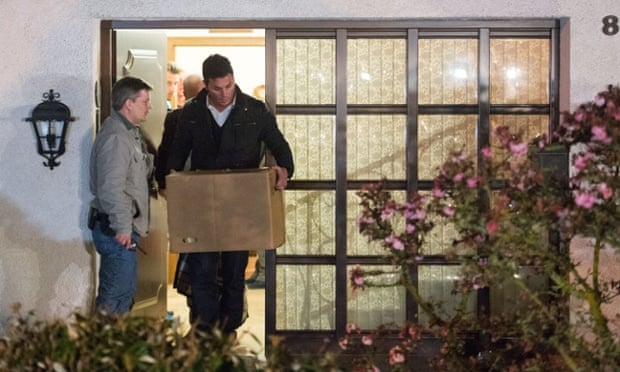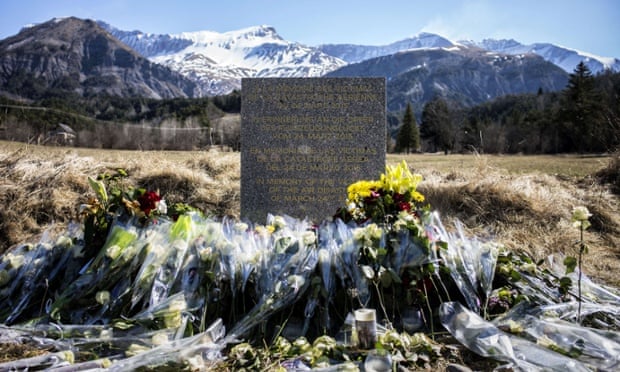Germanwings co-pilot Andreas Lubitz ‘hid illness from employers’
Investigators searching the Düsseldorf apartment of the co-pilot on the Germanwings flight that crashed into the French Alps on Tuesday have found evidence he hid an illness from his employers, prosecutors said on Friday.
The evidence is a torn-up doctors’ note, signing him off work on the day of the crash.
“Medical documents were found that indicate an ongoing illness and suitable medical treatment,” Düsseldorf prosecutors said in a statement.
“The circumstance that torn-up current medical certificates – also pertaining to the day of the act – were found, supports, after preliminary examination, the assumption that the deceased hid his illness from his employer and his professional circles.”
“Investigations as well as the assessment of the medical treatment documents will take some days. As soon as reliable findings emerge, we will inform relatives and the public.”
No suicide note or claim of responsibility has been found, the prosecutors said.
Germanwings said later that they were not aware of Lubitz’s sicknote. “Germanwings would like to clarify that no medical note was presented to the firm for this day,” the airline said in a statement.

(Police carry computer, a box and bags out of the residence of the parents of Andreas Lubitz. Photograph: Thomas Lohnes/Getty Images)
The investigation into the crash has turned to the background of the co-pilot, Andreas Lubitz, following the disclosure on Thursday that he appears to have deliberately downed the plane in a rocky ravine.
Investigators are looking for clues as to why Lubitz, who was 27, may have wanted to take his own life – and to kill 149 other people as he did so.
Dr Hans-Werner Teichmüller, president of the Deutsche Fliegerarztverband, an association of German doctors who carry out examinations on pilots and flight crew, expressed total shock at the co-pilot’s alleged actions.
“It’s horrible, it’s becoming more and more incomprehensible,” Teichmüller told the Guardian. “It’s utterly irresponsible that he flew even though he had a certificate saying he was not ready to work, and was therefore unfit to fly. Everything he did was highly criminal.”
He also talked about proposals, much-discussed in the German media in recent days, of introducing more thorough psychological tests for pilots.
“A standardised process that all budding pilots have to go through could very likely be introduced,” he said. “But a pilot that intends to do something like this could be skilful enough to pass as a well-structured person, even if they were in danger of suicide. Even with an examination process you wouldn’t have 100% safety.”
On Thursday, Lufthansa’s chief executive, Carsten Spohr, revealed that Lubitz had interrupted his training in 2009, but refused to say why. He would only say that Lubitz was eventually cleared to return to work, after passing fitness and psychological tests.
On Friday however, the German newspaper Bild said that the Lufthansa flight school in Phoenix, Arizona had designated Lubitz at the time as “not suitable for flying”.
The newspaper said he spent a year-and-a-half receiving psychiatric treatment. Several times he was forced to repeat his flying classes because of depression, before he successfully finished his training. In 2009 he was diagnosed with a “severe depressive episode”, Bild reported. Süddeutsche Zeitung said the sick note in question was written by a psychiatrist in the Rhineland.
The federal aviation office (LBA), Germany’s civil aviation office that administers pilots’ licences, has reportedly asked Lufthansa for Lubitz’s files, and said it would pass them on to the French investigators.
“Anyone with a license must report to an approved aviation doctor once a year and receive a suitability certificate,” a spokesman told news channel NTV.
The LBA spokesman said the widely-reported SIC (“special regular medical examination”) mark on Lubitz’s file could pertain to any medical problem.
Citing police sources, Bild said the investigation is examining whether Lubitz had been suffering from a “personal life crisis”. He is said to have had a relationship crisis with his girlfriend and to have suffered emotional problems. The local Westerwälder newspaper said Lubitz and his girlfriend had been together for seven years and were living in a flat in Düsseldorf.
Lufthansa has yet to respond to the claims. Bild, Germany’s best-selling newspaper, is normally – though not always – a reliable source of news, and has an extensive network of sources.
On Thursday, prosecutors in France gave details of the final moments of flight 4U9525, travelling from Barcelona to Düsseldorf. For eight minutes, during which the cockpit voice recorder revealed Lubitz said nothing but was breathing normally, the 27-year-old ignored captain Patrick Sonderheimer hammering on the cockpit door and did not respond to increasingly urgent radio calls from air traffic controllers and nearby aircraft.

(A stele, carved in French, German, Spanish and English, in memory of the victims of the Germanwings crash, is pictured in the small village of Le Vernet. Photograph: JEFF PACHOUD/AFP/Getty Images)
Emergency codes allow crew to enter an aircraft cockpit in the event of an incapacitated pilot, but the co-pilot is thought to have intentionally overridden the system, which is a post-9/11 security measure intended to prevent hijack.
“It could only have been deliberate,” said the French prosecutor Brice Robin, who gave the chilling account of the flight’s final 10 minutes. “He did this for a reason we do not know … but it can be seen as a willingness to destroy the aircraft.”
The only comfort that Robin could offer the grieving families of the 144 passengers on the aircraft was that they appear to have been unaware of their impending deaths until the last few seconds. They and the six crew members, including Lubitz, were killed instantly when the plane hit the ground and exploded.
“I think victims only realised at the last minute, at the very last minute … there were screams at the last moment just before the impact,” Robin said.
It appears that Lubitz took advantage of being alone in the cockpit to initiate the dive that ended in the crash. In response, several air carriers said they would implement a “rule of two” to avoid a pilot being left alone on the flight deck.
German airlines introduced the two-person cockpit rule with immediate effect on Friday. The German Aviation Association (BDL), which represents the airline industry, released a statement saying that the airlines had voluntarily agreed to introduce the rule “following the tragic accident in France.”
Two authorised members of the flight crew must now be in the cockpit at all times. The BDL’s statement said the measure had been taken in coordination with the German transport ministry and the federal aviation office.
Airlines in Europe are not required to have two people in the cockpit at all times, unlike the standard US operating procedure, which was changed after the 9/11 attacks to require a flight attendant to take the spot of a briefly absent pilot.
EasyJet was the first airline in the UK to announce it would implement it rule from Friday. “The safety and security of its passengers and crew is the airline’s highest priority,” an easyJet spokesperson said.
Some experts said even two was not enough, and called for rules to require three.
“The flight deck is capable of accommodating three pilots and there shouldn’t ever be a situation where there is only one person in the cockpit,” said James Hall, a former chairman of the US National Transportation Safety Board, referring to the “jump seats” all airliners are equipped with.
Others questioned the wisdom of sealing off the cockpit at all. “The kneejerk reaction to the events of 9/11 with the ill-thought reinforced cockpit door has had catastrophic consequences,” said Philip Baum, London-based editor of the trade magazine Aviation Security International.
[via The Guardian]









